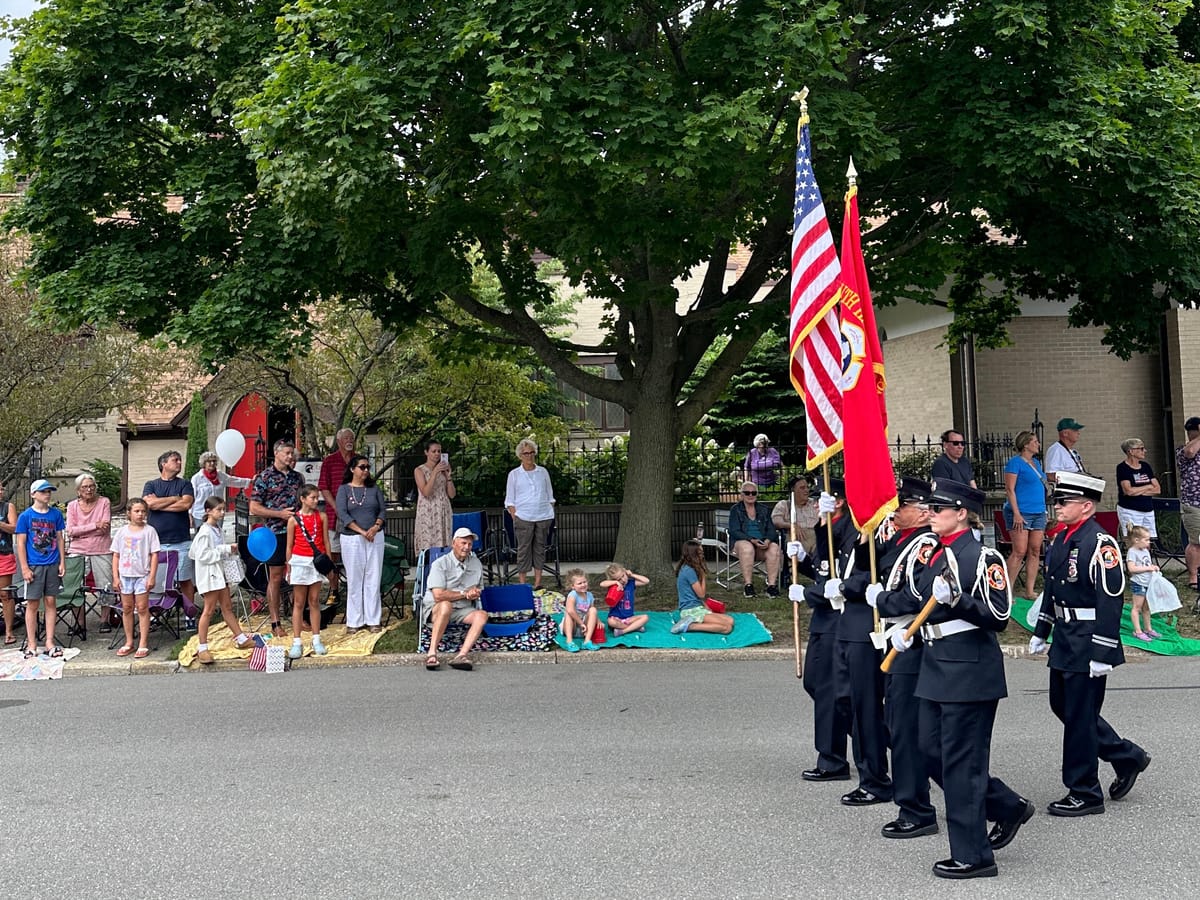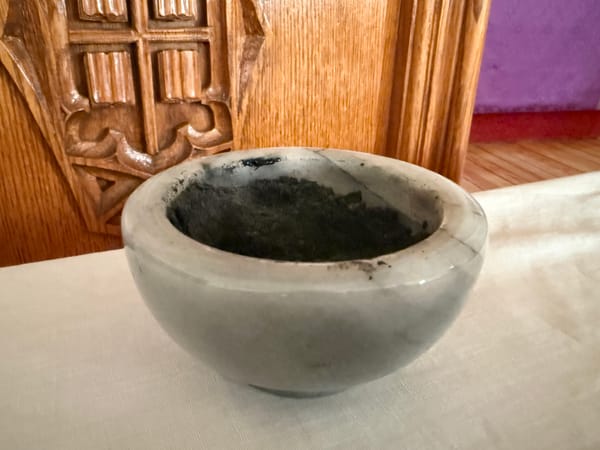Flags, Faith, and Service to the King
Our relationship with God, our willingness to live lives of love and peace in relationship, our identity as a new creation, that is indeed everything.

July 6, 2025 - The Fourth Sunday after Pentecost
My friends, I speak to you today in the name of one God, Father, Son, and Holy Spirit. Amen. Please be seated.
Good morning, Epiphany. Happy Independence Day, happy Fourth of July. It has been quite a week in our small town. I saw an estimate that said 70,000 people descended on South Haven this week, which seems incredibly high to me, but the traffic after Thursday night’s fireworks might attest to that. It gets crazy out there. I know some of our regulars are out of town with their families this weekend, but many have family come to town for this weekend, and if you are an unattached visitor this morning too, thanks for being here.
For those here for the first time and even for those who might be a bit more forgetful these days, we’ve been spending time here on Sunday mornings over the past few weeks in the books of Galatians and Luke, with Galatians specifically talking about the fruits of the Spirit: love, joy, peace, patience, kindness, goodness, faithfulness, gentleness, and self-control. I think that’s going to be helpful context yet again for us this morning: a life of following Christ, a life worth living, it is marked by those fruits. Someone pursuing those ends, someone you can identify by those fruits, that is someone worth following.
And also, again this week, it has been difficult to be plugged into the news yet again. On Thursday, a massive bill was passed by Congress, signed into law by the President on Friday. The bill will affect Medicaid, SNAP/food stamps, clean energy, taxes; it will increase the budget for ICE by more than a hundred billion dollars. Wherever you personally land politically, this seems to be a pivotal moment for our nation, one that will dramatically shape the next few years. For our part, in this faith tradition, the Episcopal Church’s Presiding Bishop, Sean Rowe, released a statement on Thursday that said, in part, “God calls us to place the most vulnerable and marginalized at the center of our common life, and we must follow that command regardless of the dictates of any political party or earthly power. We are now being faced with a series of choices between the demands of the federal government and the teachings of Jesus, and that is no choice at all.” Bishop Rowe has met this particular moment in American history by repeatedly presenting the Episcopal Church in sharp contrast to the federal government, a clear alternative to the ways of power we often celebrate on Independence Day, this week in particular. He has, and I think I have (though maybe a bit more delicately), he has reminded us to follow Jesus and not American politicians, to remember that Jesus is our King, to regard our faith as “a promise of liberation” and not as “a tool of dominion and power.”
So, what do we do with this? How do we still celebrate with fireworks, how do we still have an American flag in our building, this Sunday perhaps alarmingly placed at the door to the nave? How do we maintain our identity as Christians in a world of patriotism and nationalism, of flags that often communicate agendas rather than mere locations? I talked last week about wearing my collar at our local Pride festival; someone at the South Haven Indivisible table tried to give me a small American flag to carry. I couldn’t do it, it felt too loaded for me there. I was trying to be a safe presence that day, and I felt like a collar and a flag would have been too much, that would have carried too much baggage for too many people to bear. So how do we juggle all of this, especially this weekend?
Well, my answer should not surprise you, and I’ll tell you my answer now in case I lose you over the next few minutes of Bible. My answer is a theme of how we do everything here at Epiphany; my answer is one based in what I have learned here and everything I’ve learned as being a part of a church over 41 years of life. My answer is this: we do all of this with love, we do all of this juggling of politics and identity in committed, loving relationship with each other, never as disembodied digital personas blasting out our opinions on social media or in angry text messages or in emails, but humbly, with each other, face to face. How do we handle the flag and our faith and our personal responses to legislation or policies that we may disagree with? In love... and in loving relationship.
In today’s Gospel reading, we find Jesus sending out seventy appointed apostles in pairs to every town and place where he intended to go. “The harvest is plentiful, but the workers are few,” he says, in one of the most quoted verses of my young life. Some church traditions, like the one I grew up in, they place a heavy emphasis on evangelism, on missionary work, on sharing the good news of Christ wherever we go, in schools or workplaces or neighborhoods. This can be problematic when it is done in judgment or in condescension, as many of us here have experienced. The church sadly often presents itself as a place with all the answers, the exclusive ticket to eternal life, a judgmental place, one where we have to gather everyone inside, get them all on our team, make them say they believe what we say we believe. One biblical scholar I read this week wrote that in Jewish texts, harvest imagery was the imagery of judgment, God’s judgment... a Jew himself, Jesus uses it that way on occasion too: we have wheat and chaff, we have seeds that fall on good soil and bad soil. But Jesus is not using the harvest as judgment in this text. No, he is sending people out to share the good news of salvation, of love, of the kingdom of God coming near, embodied in him. “Peace to this house,” the apostles are to say wherever they go, sent out as lambs in the midst of wolves. “Peace to this house.”
There’s another way that Jesus could have sent them out. Jesus could have sent them out with signs that say, “Repent you sinners!” “The end is near!” “America is doomed!” “Destruction is imminent!” “God hates you!” “You’re going to hell!” Those are actual words from actual signs held by the infamous Westboro Baptist Church outside of pride festivals. Those are the messages they feel called to share with the world around them, hoping to scare people into following Christ. The world has too many examples of angry Christians, operating with fear and hate as their underlying message. There was one such person on the street corner of Kalamazoo and Phoenix here this week, holding signs that threatened eternal damnation, held while yelling his message into a megaphone. “Peace to this house” was not his first message... Jesus did not send his apostles out like that, he does not send us out like that today. That message does so much more harm than good.
Jesus sent his seventy apostles out to deliver a message of peace, to deliver his message of overwhelming, unbelievable love that was freedom. His hearers were no longer bound by laws and disciplinarians but called to participate in the divine dance of love. He sent his apostles with the power to heal, to cast out demons, and they returned to him with joy. Joy is the theme of our readings today, rejoice with Jerusalem, rejoice with her in joy, make a joyful noise to God, alleluia, sing, rejoice. The seventy returned with joy, and Jesus reminds them to rejoice not in their power but in the fact that they were living the eternal life, that their names were written in heaven, that they had found love and they were living in love and they were sharing that life-changing love with those around them. Love is the message, love is what we are about as the church, and love will bring us joy.
But the flag, patriotism, the state of our divided States of America... how do we live in love and joy let alone peace and patience and kindness when the world seems to be crumbling around us? It’s difficult, I know. As I’ve made clear, it’s been a struggle for me over the last few weeks. We have two messages that help guide us in the text today.
First, when Jesus sends these apostles out, he gives them a healthy dose of Jungian psychology, he helps them to understand self-differentiation. “Whoever listens to you, listens to me,” Jesus says, “Whoever rejects you, rejects me and the one who sent me,” who is God. These disciples need not concern themselves with how their message of peace and love is received, because they are messengers for Christ. They are to live this life of love, of the fruits of the Spirit, they are to be intentional with their message, with the relationships they build, with the people they visit and eat with and spend time with. They are to share the love of God with all around them; Jesus knows that will be enough to change the world. But they will be met with hardship. Like last week, they are told to take that hardship and rejection and simply move on to the next town, to not let it bother them. We too must do what we can in the here and now, two thousand years later, to live lives of love, to have intentional relationships that show people what the love of Christ looks like, not threatening damnation in our evangelism but inviting everyone through our own lives into the way of peace, into the kingdom of God. We live that life and let others’ responses to that life be their response. We trust that Christ’s love will be enough. It is not always easy to be in that open kind of ever-loving relationship, but it is our call.
And the second message that helps guide us, especially in this most patriotic week, comes from Paul in his letter to the Galatians. He covers a lot in the 16 verses of our lectionary today, but in the last paragraph he gives us a little soundbite we can carry with us on the journey. The Jewish Christians are fighting over circumcision, about the steps they’ve taken to be identified as faithful followers of God, demanding all the new and uncircumcised followers of Christ to take that step too. We won’t talk about first century penises too much here this morning, but circumcision was one of the most important markers of Jewish male identity, their religious and their national identity. Paul’s response? “Neither circumcision nor uncircumcision is anything, but a new creation is everything!” “May I never boast of anything except the cross of our Lord Jesus Christ.”
Friends, this morning, two days after Independence Day in a very divided United States, let me remind you from this pulpit that though we are Americans, our national identity is ultimately as unimportant as their circumcision. Let me remind you that our relationship with the God of the universe, that our willingness to live lives of love, joy, and peace in relationship with each other, that our identity as a new creation, that that is indeed everything. If we need to boast, let it be in Christ, as we leave this place “in peace to love and serve the Lord,” as we leave like the seventy apostles, sent out into a world now marked by flags and borders and so many divisions. And let us boast in Christ with our lives, lives marked by love, lives spent in committed relationship to each other, not avoiding difficult or troubling issues, but engaging all things in joyful and humble service to Christ our King, whose kingdom stretches from every shore to every shore.
Amen.




